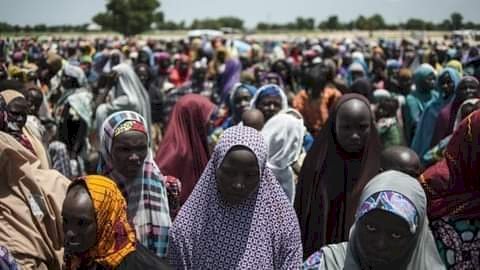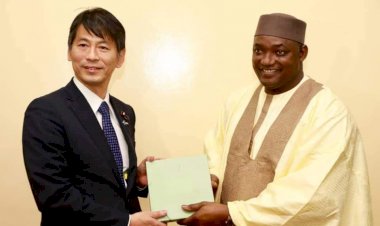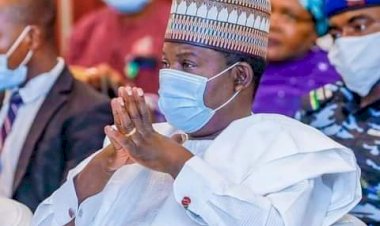Refugees commission enrolls IDPs, refugees into NHIS

The National Commission for Refugees, Migrants and Internally Displaced Persons, NCFRMI, says it has enrolled refugees into the National Health Insurance Scheme, NHIS, for effective healthcare management.
The Federal Commissioner, NCFRMI, Basheer Mohammed, disclosed this at a two-day stakeholders’ meeting on implementing the Global Compact on Refugees, on Thursday in Abuja.
Mr Mohammed, who was represented by Hassan Ejibunu, Director, Refugees and Migration, NCFRMI, also said that the commission had concluded plans with the management of NHIS to begin the process of enrolling IDPs into the scheme.
According to him, in the interim, the commission is providing medical support for IDPs through collaboration with the National Hospital in Abuja.
“Nigeria came up with four pledges at the Geneva meeting on the Global Refugees Forum (GRF) with emphasis on the core areas of interest for durable solutions for refugees, IDPs, returnees and host communities.
“These pledges centred on inclusion of Persons of Concerns (PoCs) in the national development plan, strengthening protection capacity and ensuring availability.
“Others centred on access to durable solutions and ensuring active participation at regional and sub-regional efforts to address root causes of displacement.
“I am pleased to inform this August gathering that giant strides have been made towards the inclusion of our PoCs in the national development agenda of the country.”
He said that in a bid to foster self-reliance and sustainable livelihood among PoCs, the commission had begun series of projects geared towards ensuring economic empowerment of PoCs in Nigeria.
Mr Mohammed noted that the project, titled: “Project Reliance”, which was being undertaken in collaboration with the Central Bank of Nigeria, CBN, would empower one million PoCs in the country.
“The project will run nationwide and the first phase of verification of beneficiaries has been concluded in Borno.
“Also, the proposed Project Resettlement Cities is another durable solution project of the commission aimed at resettling more than 5,000 IDPs in Nigeria in its first phase,” he added.
He revealed that the pilot phase would begin in Borno, Katsina, Zamfara and Edo, adding that the commission had offered durable solution to 785 IDPs.
“Nigeria has also entered into a tripartite agreement on the return of Nigerian refugees in Cameroon.
“Efforts are being made toward signing a Tripartite Agreement on the safe and dignified return of Nigerians in the Republic of Chad and Niger in 2021,” he said.
Mr Mohammed said that the commission had been holding Town Hall Meetings with the PoCs to discuss their needs and areas of support they would require toward enhancing their living conditions.
Also speaking, the Minister of Humanitarian Affairs, Disaster Management and Social Development, Sadiya Farouq, said that the aim of the meeting was to create an incentive for stakeholders to join forces and pool resources to address the humanitarian challenge.
“To do this requires addressing underlying causes in a sustainable and humane manner.
“It also enables stakeholders to approach the humanitarian challenge from a durable solution perspective which requires closer, stronger and well-coordinated partnerships and collaborations across all levels of governance,’’ Mr Farouq said.
She said that the ministry would continue partnering with relevant stakeholders to achieve the Federal Government’s objectives for refugees.
According to her, the world is facing serious humanitarian challenges with available statistics from the UN Higher Commission for Refugees, UNHCR, showing that there are 79.5 million Forcibly Displaced Persons, FDPs, including 25.9 million refugees and 41.3 million IDPs in the world, as at 2019.
“In the Lake Chad Basin region, there are 3.3 million FDPs, comprising 2.7 million IDPs in North-East Nigeria, 513,000 IDPs in Cameroon, Chad and Niger and 244,000 refugees in the four countries,’’ she said.
She said Nigeria had the highest number, and carried the heaviest burden of the humanitarian challenge.
She further said that the Nigerian government had been providing support to refugees in Nigeria through the National Commission for Refugees, Migrants and IDPs.
“We also work with UNHCR and the Nigeria Immigration Service to issue a Convention Travel Document to enable refugees and asylum seekers to exercise the fundamental human rights of movement with all internationally recognised protection and privileges,” she said.
The News Agency of Nigeria reports that the global compact on refugees was facilitated by the UN Higher Commission for Refugees in Nigeria in collaboration with the Federal Ministry of Humanitarian Affairs, Disaster Management and Social Development and NCFRMI.


















































